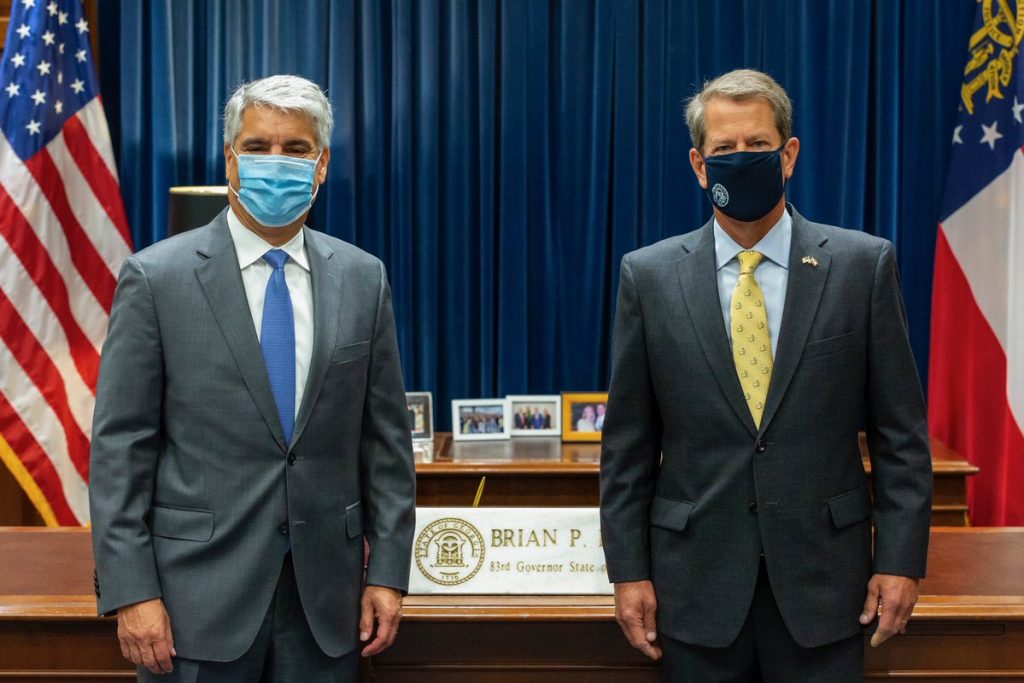On May 11, Georgia Gov. Brian Kemp became the first governor in the U.S. to lift his state’s lockdown, igniting a bitter and regrettably partisan conflict between him and other state and local officials. On Aug. 18, a mere three months after Georgia reopened, the White House reported that the state has the highest rate of new coronavirus cases in the country.
It is no secret Kemp reopened the state far too early, and the consequences of his poor decisions have become grimly obvious. It is time to shut Georgia down again, from bars and restaurants to colleges and universities, lest more Georgians lose their lives.
Contrary to what President Donald Trump has repeatedly and incorrectly claimed, this virus has not suddenly disappeared. Georgians have paid the price of this false rhetoric with more than 200,000 confirmed cases, the fifth-highest per capita prevalence in the country and more than 5,000 dead Georgians. Schools, as they reopen, have become super-spreader sites largely because of our state officials: Kemp refused a statewide mask mandate and sued Atlanta Mayor Keisha Lance Bottoms for imposing her own. Now, the virus is everywhere in Georgia, making the earlier outbreak in April and May pale in comparison to the crisis now on our hands.
We are neither scientists nor data analysts, but the virus’ resurgence in Georgia and nationwide is easy to follow: fear of negative economic consequences led Kemp and officials in states like Texas and Florida to prematurely reopen while largely ignoring public health protocols. It is no surprise, then, that those three states account for three of the largest outbreaks within the last few months.
States that similarly reopened too soon now face extreme precocity, compared to states that reopened their economies gradually. In Arizona, one of the first states to reopen, small businesses that weathered the initial surge of COVID-19 are now unable to handle a second wave of cases. Without the safety net of the now-expired coronavirus relief bill, many unemployed residents will face destitution and even eviction amid a worsening pandemic.
Like in Arizona, small businesses and employees in Atlanta are suffering the brunt of premature openings. The financial strain of operating businesses without steady revenue has caused small business owners to close their stores permanently. Ironically, Kemp’s attempt to save the economy has put it in even more dire straits. In fact, shutting down businesses now is essential to recapturing a thriving economy in the long run.
Georgia’s grand reopening invited an avoidable wave of new cases and deaths that overwhelmed hospitals in July. At this rate, Georgia will likely face a challenging fall and winter, especially as flu season emerges. We need to shut down now to prevent more deaths that are themselves preventable. Experts’ prediction of nearly 3,000 deaths in Georgia if it remained closed is a far cry from the current death toll of over 5,000. The urgency to close again has never been more grave.

We implores Fenves to pressure Kemp’s administration to shut down businesses immediately for the safety of our constituents./ courtesy of Greg Fenves, Twitter.
A more proactive state-level response to COVID-19 potentially would have made a broader reopening of Emory’s campus more plausible, the kind administrators desired in Emory’s original reopening plan. However, any further reopening in the near future is certainly blocked by the state’s continued struggle with COVID-19. If the University is to restore a semblance of normalcy for its students, we must all do what we can to curb the spread of the violence and encourage Kemp to take more aggressive action to combat the disease.
Emory, a leading public health university headed by President Gregory L. Fenves, must pressure Kemp’s administration to enforce stricter policies, such as temporarily closing the state, especially institutions that are hotspots for COVID-19, and using state relief funds for low-income individuals and small businesses. Although the White House has marginalized the Centers for Disease Control and Prevention (CDC) in its pandemic response, it is crucial for all Georgians, including Emory students on and off campus, to follow CDC guidelines. If our elected officials refuse to act in our interests, we must act on our own by wearing face masks in public and social distancing.
Every individual has a role play in the collective effort to reduce the spread of COVID-19, but a response by Kemp and Georgia state officials that includes more frequent and accessible testing, a comprehensive contact tracer program and a lockdown of most businesses in the state, is all that stands between us and a catastrophe this fall and winter.
The above editorial represents the majority opinion of the Wheel’s Editorial Board. The Editorial Board is composed of Brammhi Balarajan, Zach Ball, Jake Busch, Meredith McKelvey and Ben Thomas.
The Editorial Board is the official voice of the Emory Wheel and is editorially separate from the Wheel's board of editors.





The fear factory is unprecedented. The news media, people such as yourself Are on a path to destroy any remote chance of coming out of the economic downturn this has caused. Maybe if you preached about eating right, building your immune system, and getting off your fat asses and exercising, you would have a much better chance at getting through this. Me and my wife have had it and we made it through no problem
And that’s a Blessing but I completely agree with this article. People need to follow the CDC guidelines if our government won’t. Of course everyone need to take better care of their health but you and your wife saw that that only didn’t stop you all from contacting the virus. I will continue to wear a mask, social distancing, exercising, and eating healthy.
Georgia is not shut down. Numbers are not outrageous. More political BS. Ask someone who works in a hospital. Caution is a must but not going insane. We have to get the country going again.
Thank you. My views exactly.
Pete again. My reply was for RIGHT.
I agree. Use your head and take simple safety measures.
You’re wrong, Right. Do you and your wife cancel the 5000 people who have died of Covid?
Trump IGNORANCE and DELUSION will surely kill many more Georgians. As always it will be up to caring citizen to save the feckless.
I would guess that what this editorial is trying to say is that we Georgian’s are to stupid to protect ourselves. All it takes is common sense. Wear a mask when in public and sanitize often. Geesh 🙄
I agreee with you except for your comments on Emory. Emory is only worried about their bottom line. Emory Healthcare treats their employees with COVID 19 concerns like they don’t know the health ramifications of the disease. No consideration for employees health or safety. People were not wearing masks or put in quarantine. Still not. BEWARE!
Do you actually think the citizens of our community would comply? We are over this BS and sick and tired of the media fear mongering by pushing articles like this. Thanks but no thanks
Joe,
It’s nice to know that you and Melissa and Right are part of the problem not the solution. If we had all spent 6 weeks of the protocols back in March or April or even May we would have lowered this plague numbers to a level where we could have safely opened businesses and our kids would be in school. But here we are in late August and we are starting over.
Blame the media or the Democrats or the Chinese or any other conspiracy is the lazy and ignorant way to divert attention away from people like you. Join the majority and let’s look out for each other.
There are numerous problems that need to be addressed but they need to take a back seat to getting this virus under control. The economy, return to school, Black Lives Matter, voting rights, police reform etc can have their time but not while we are under siege from corona-19. Help us get this under controller
Thanks
You hold individual responsible just because they’re in an elected office. NO ONE has a crystal ball, not even you, to know exactly what steps to take.
Most of all, individuals must take responsibility for themselves. The government doesn’t need to have to tell you to wear masks, social distance, etc.
Each person must be responsible.
People like you want to place blame on someone.
You’re the fear factor.
Drink the cool aid much?
Jeez….can’t you tell yet that most Americans are over it and realize that shutting down has a FAR greater impact long term than the virus does. Let me guess…you feel like government should fund everyone too? And how exactly do we pay for this? Government funded projects/payouts/whatever ALL have to be funded by working people paying taxes.
Anybody that agrees with this article needs To learn to wash they hands ware a mask when in public places use hand sanitizers stay 6 feet or more away from others and stop being afraid and do their part and make sure they encourage others to do their part , virus can’t be spread if we ware a mask and keep hands sanitized don’t touch your mask don’t touch your face without your hands being washed and sanitized it is not the elected officials at fault it’s we the people who are not following the guidelines shouldn’t have to order anyone to do something that can possibly save their own lives as well as that of their loved ones family or friends the number of cases are all wrong
It’s lower than they say on deaths and positive cases so just live and do your part to stop it’s spread stop blaming everybody else
This is fake news to scare people which is what the Democrats want. You can’t blame Kemp because people don’t have any common sense.
People complain about everything that doesn’t fit their agenda. They protest, riot, have parties, funerals but no social distancing, no mask. Then they blame someone else when they get sick.
Get off your lazy butts & go to work, & school.
Get out & vote. If you can go to stores & other places you can vote in person.
Social distancing & wear mask. It’s that simple.
This is not the Black Death that swept through Europe. Doctors in those medieval days determined that socially distancing 6ft. and wearing a face covering as well as washing your hands often helped slow the spread of the plague. That is the lens through which modern Doctors view the Covid-19 as it helps in getting government research grants.
I think it’s unfortunate that so many people are unwilling to even consider others. They whine about the economy yet are unwilling to help stop the spread. Obviously the only way for the general public to get the point is for them all to end up hospitalized or on ventilators. “Buying into the bs”. The only bs is that people aren’t willing to listen to science. Sane science, not the kind spewed from conspiracy theorist mentality coming from the lunatic in charge of leading our country.” It’s more than obvious in the comments here that people are far more concerned about their pocketbook than the health of our state & nation. Well, when your dead from Covid-19, the rest doesn’t matter.
Of course, it was quite alright for hundreds, if not thousands to be gathered closely together demonstrating in the streets, many with no mask. It was shortly after that the numbers started going up, but it’s the fault of the Governor for opening up the state too soon! Really??? It’s amazing to me that people can have huge parties, all of these protesters can march in the streets side by side, but people aren’t supposed to go to church, small businesses aren’t supposed to be able to open, etc., and all of the problems are the Governor’s fault. Sorry, I’m just not buying this logic.
Enough already. Your posting an article from May it’s Aug. 28th. Are you kidding us. The CDC has lied about our #’s since day one. I live in Georgia and your full of lies. We don’t appreciate people like you printing lies about us. We opened and God Bless KEMP for having balls enough to do it. We are open and living NORMAL lives something people like you are trying to keep from the rest of the country
TodAy the cdc admitted they were wrong about The numbers of positive test there was no where near as many as they reported and the death rate was only 6 percent it is time to stop listening to the media and living scared.Gov.Kemp is doing a great job,.Listen to him